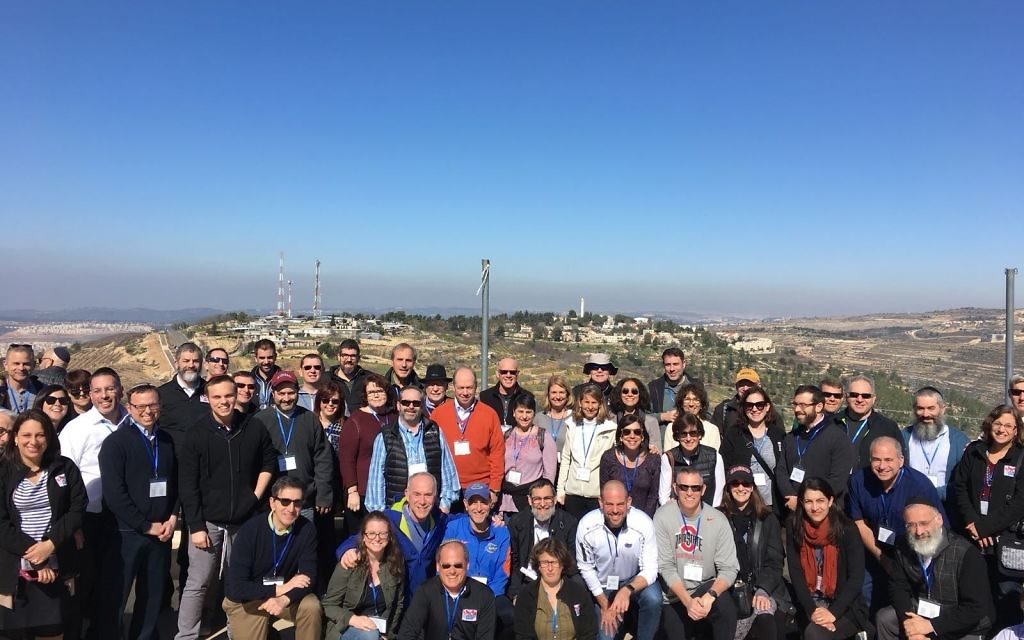Federation Mission Builds Bridges to Jewish Future
The Front Porch trip to Israel helps form vital connections for the Atlanta community.
Almost 70 leaders of Atlanta Jewish organizations went to Israel on a mission of learning, understanding and relationship building over Tu B’Shevat.
The group went as part of the Jewish Federation of Greater Atlanta’s Front Porch initiative. Goals for the trip included strengthening Atlanta community partnerships, creating a “living bridge” between Atlanta and Israeli communities, and harvesting concrete ideas to bring back to our own Front Porch.
The group was a diverse cross-section of community organizations. Participants included 15 pulpit rabbis from every denomination that serves our community. Large organizations such as the Marcus JCC and Jewish Family & Career Services were represented, as were smaller organizations such as the community mikvah (MACoM), Limmud, the Jewish Fertility Foundation and InterfaithFamily/Atlanta. In most instances, the executive director (or rabbi) and the lay president both attended.
Get The AJT Newsletter by email and never miss our top stories Free Sign Up
As diverse as the group was, the itinerary was equally wide-ranging. Speakers were not from the Knesset or well-established organizations.
Examples included a refugee from Sudan, a young entrepreneur raising money for an invention, a Palestinian in the West Bank who illegally built the first school in his Arab village so his children could learn to read and write, a kibbutznik on the border with Gaza, and a cardiologist/colonel who is part of an IDF mobile field hospital that was deployed in Haiti and Nepal (the unit is now recognized by the World Health Organization as the best in the world, evaluated by peers in 83 countries).
The institutions visited were also off the beaten track: the Taglit Innovation Center at the Tel Aviv Stock Exchange; the Chicago Community Center in Lod, which runs day programs for Jewish and Arab children; Bina, the only secular (and social-action-oriented) yeshiva in Israel; the Israeli Gar Youth Center, which is the only organization in Israel focused on serving LGBT youth; and the Belz Hasidic Dynasty Synagogue in Jerusalem, which hosts 8,000 to 10,000 people on Shabbat.
While diversity was a core component, Avraham Infeld shed light on the prospect of bringing us together and succinctly summed it up in his introductory comments.
Modernity has fractured the Jewish people. Today, some of us still practice our religion in a way that we perceive it has been practiced for over a thousand years, with no regard to modern times. Today, some of us have chosen to assimilate, partially assimilate or partially assimilate part of our lives. Today, some of us have chosen a new form of Jewish religious identity, such as Reform Judaism or Modern Orthodoxy. Finally, today, some of us are Zionists in Israel, Zionists in the Diaspora or not Zionists at all.
Modernity has caused more internal conflict than any external threat. The result is that Judaism has more voices than ever before in our history. The question becomes “What keeps us together?”
Avraham would argue that what we have in common is more important than our differences. Things like shared values, common enemies, an ancient language, core beliefs, tradition, trust, and, the most important, a shared communal memory. Being a people (rather than just a religion) will ultimately tip the scale in bringing us together rather than tearing us apart.
Eric Robbins told the group that success is already evident. We attended, we were present and in the moment, and we were not torn asunder by difficult conversations.
Bridges are being built within the Atlanta community and to Israel. No other Federation community is having these discussions.





comments